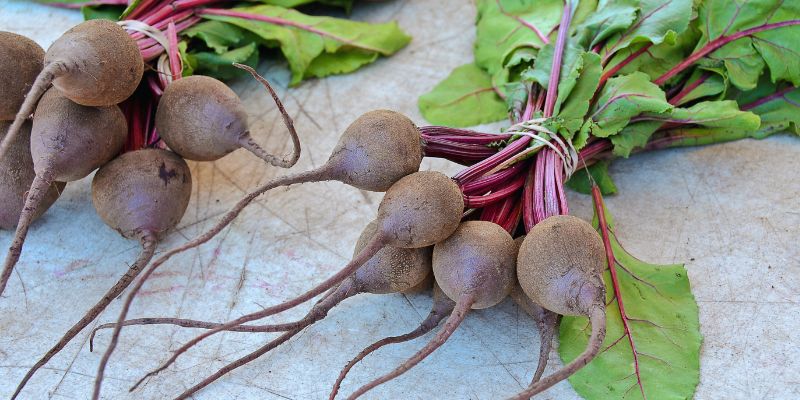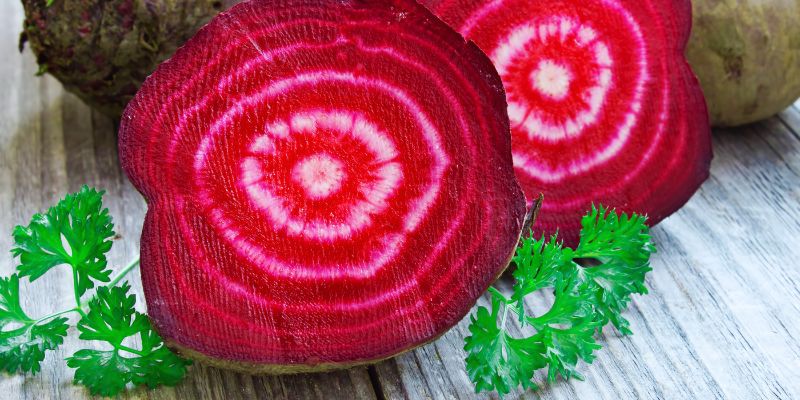Beets are a colorful vegetable known for their earthy taste and odor. They are an excellent source of fiber, minerals, and potent antioxidant betalains, which give beets their vivid color. Remember that beets not only give your plate a splash of color, but their benefits for the heart and circulatory system make them special.
Beets can also lower homocysteine levels, cut LDL cholesterol, promote artery health, and increase blood flow. Besides that, betalains, present in beets, may help prevent cancer and other illnesses by lowering inflammation. If you don't like beets or have not consumed them earlier, you should make some space in your plate now for this red-ruby vegetable after knowing its health benefits!

What are the Health Benefits of Beets?
Below, you can find the impressive health benefits of beets that attract people to add them to their daily diet. So, let's look at each of them one by one here:
May Lower Blood Pressure
Your heart and blood arteries may get damaged by high blood pressure. It is one of the most potent risk factors for cardiac disease, stroke, and young death around the world. Eating fruits and vegetables high in inorganic nitrates may reduce the possibility of heart disease by lowering blood pressure and promoting the production of nitric oxide. Nitrates, which are abundant in beets, are converted by the body into nitric oxide. By relaxing and widening the blood arteries, nitrates lower blood pressure. Beets are also an excellent source of folate, and consuming more folate may help decrease blood pressure.
May Improve Digestive Health
Beets are good for digestion and are high in fiber. Fiber helps to grow beneficial bacteria in the gut. Your immune system is strengthened, and diseases are fended off when your digestive tract is full of beneficial microorganisms. Fiber is not digested, so it makes its way to the colon, where it gives waste more volume and nourishes beneficial gut bacteria, which reduces bloating. It keeps you regular, supports digestive health, and guards against diverticulitis, inflammatory bowel disease (IBS), and constipation. Additionally, fiber has been associated with a lower chance of developing chronic illnesses. Also, betaine, which is found in beets, can aid in digestion.
May Help Fight Inflammation
Betalains are substances that give beets their distinctive red color. Because of their strong antioxidant properties, betalains may be able to lessen inflammation's effects. Nitrates, which are abundant in beets, also lower inflammation by clearing the blood vessels from hazardous chemicals. Due to higher amounts of betalains and nitrates, beets are a fantastic option for those suffering from inflammatory diseases like fibromyalgia or rheumatoid arthritis. Manganese, another mineral found in beets, aids in the synthesis of superoxide dismutase (SOD). SOD fights inflammation and free radicals, which can harm cells. Beets' phytonutrients are also fantastic for reducing inflammation in the kidneys and liver and aiding in their cleaning by boosting glutathione production, the body's normal detoxification process.
May Improve Athletic Performance
For athletes, beets can be a covert weapon. Beets' dietary nitrates have the potential to improve athletic ability. Nitrates have an impact on physical performance by increasing the effectiveness of mitochondria, which generate energy in your cells. Beet intake may enhance endurance, increase oxygen consumption, boost running and cycling performance, and improve endurance during exercise. It's crucial to remember that two to three hours after eating beets, blood nitrate levels peak. It is therefore recommended to ingest them a few hours prior to training or competition to optimize their potential advantages.

May Support Brain Health
Mental and cognitive skills decline with time and increase the possibility of neurodegenerative diseases like dementia. By increasing blood vessel dilatation and boosting blood flow to the brain, the nitrates in beets may enhance brain activity. Beets increase blood flow to the brain's frontal lobe, which is linked to higher-order cognitive functions, including working memory and decision-making. Response time and other motor skills improve with increased nitrate consumption significantly. Uridine in beets, aids in preserving healthy amounts of dopamine. Dopamine supports the regulation of brain function and manages the reward, emotion, and pleasure centers of the brain.
May Have Anti-Cancer Properties
Beets, as an essential food, may help treat cancer and are an excellent source of polyphenols, flavonoids, dietary nitrates, and other beneficial nutrients. All these may offer a comprehensive way to avoid cancer and control side effects from chemotherapy. The potent substance found in plants, betacyanin, which gives beetroot its vibrant color, also helps prevent the growth of bladder cancer and other cancers. Other possible cancer-fighting substances found in beetroot are kaempferol, ruin, and ferric acid.
May Help Balance Energy Intake
Beets's nutritional qualities make them a good choice for a balanced diet. They may assist you in managing the amount of energy you consume because they are high in water and low in fat and calories. Additionally, they have enough amount of fiber and protein despite having few calories. A moderate weight can be more easily attained and maintained with the help of both of these nutrients. Beets' fiber may also help with digestion, curb hunger, and increase feelings of fullness, all of which can help you consume fewer calories overall. Furthermore, you can increase your daily consumption of fruits and vegetables to enhance the quality of your diet by adding them to smoothies or other recipes.
It may be Beneficial for the Skin.
Beets may help with blood circulation and inflammation, two factors that are essential to the health of the skin. It has several health benefits for your skin, like vitamin C and polyphenols in beets can help minimize fine lines and wrinkles. As they promote the production of melanin, beets can help alleviate hyperpigmentation. Beets' iron and antioxidants can lessen dark circles. It helps keep the skin moisturized because it is 87% water. Rich in vitamin C and antioxidants, beetroot offers a potent defense against free radicals. It protects your skin cells from oxidative stress and keeps your skin looking young.
Conclusion:
Beets are unbeatable! For multiple health benefits, incorporate these nutritional powerhouses into your diet. They are an ideal choice for a balanced diet. It may improve athletic performance, reduce inflammation, promote the health of your heart, brain, and digestive system, and may even reduce the development of cancer cells. The best part is that beets are tasty and simple to eat. You can add it to salads, side dishes, smoothies, dips, and juices.







